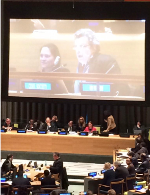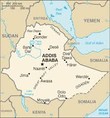Social Watch news
Published on Mon, 2015-02-09 20:07
2015 is a pivotal year. The post-2015 sustainable development agenda currently being drafted is premised on the reality that the present model of development is not working, given worsening inequalities and straining planetary boundaries. All countries and peoples—and the planet on which we depend–have the right to live with a better model, one that is inclusive and sustainable. |
Published on Mon, 2015-02-09 11:16
The Arab NGO Network for Development (ANND) organized, in cooperation with the CSO Partnership for Development Effectiveness, a sub-regional workshop held in Beirut, Lebanon on January 24 and 25, 2015 for the Levant states. This workshop, aimed to assess and determine the mechanisms and prospects of accountability for the various parties involved in development, be they governments, donors, civil society organizations or the newcomer, i.e. the private sector. Sessions focused on two issues, accountability and the civil society working. The workshop was attended by representatives of organizations from Lebanon, Syria, Jordan, Bahrain, Iraq and Palestine. |
Published on Sun, 2015-02-08 11:26
The Community of Latin American and Caribbean States (CELAC), inaugurated in Venezuela in 2011 and comprising all 33 nations of the region, held its third summit in San José, Costa Rica on 28-29 January 2015. The summit also marked the handover of the Presidency of CELAC from Costa Rica to Ecuador. CELAC is an important example of a developing country forum. It serves as a mechanism of dialogue and political coordination. |
Published on Thu, 2015-01-29 13:08
You are cordially invited to a side-event by the Permanent Mission of Brazil to the UN, CIDSE and Social Watch on Thursday, January 29, 2015 in the UN Conference Building, New York. Dealing with responsibilities in a financing sustainable development context, this event seeks to generate discussion on conceptual challenges such as an evenhanded approach to the three pillars of sustainable development, adapting a framework like the Financing for Development process to the universal agenda of the Sustainable Development Goals without denaturalizing and decontextualizing it and how to incorporate important principles agreed at the UN Conference on Sustainable Development. |
Published on Thu, 2015-01-29 13:08
A broad international group of Civil Society Organizations following the Financing for Development (FfD) process prepare a response to the FFD Elements Paper. |
Published on Wed, 2015-01-28 19:15
"The sovereign debt of today, particularly in developed countries that are highly indebted, is the results of the irresponsible indebtedness of the private sector that was bailed out with public monies" said Roberto Bissio, Social Watch Coordinator, at the first preparatory session of the Addis Ababa Conference on Financing for Development on January 28, 2015. Bissio therefore suggested that the conference should return to the analysis of EXTERNAL DEBT (including public and private debt) as more appropriate to identify vulnerabilities than the current reduction of the agenda to "sovereign debt". Further, the Social Watch representative called for the conference to address the link of finances with inequalities and with the transformation of unsustainable consumption and production patterns. Read his complete intervention below or see the video here or download here the pdf version. |
Published on Tue, 2015-01-27 10:40
An overwhelming majority of citizens in the 28-member European Union (EU) – which has been hamstrung by a spreading economic recession, a fall in oil prices and a decline of its common currency, the Euro – has expressed strong support for development cooperation and increased aid to developing nations. A new Eurobarometer survey to mark the beginning of the ‘European Year for Development,’released Monday, shows a significant increase in the number of people in favour of increasing international development aid. The survey reveals that most Europeans continue to “feel very positively about development and cooperation”. Additionally, the survey also indicates that 67 percent of respondents across Europe think development aid should be increased – a higher percentage than in recent years, despite the current economic situation in Europe. |
Published on Mon, 2015-01-26 08:08
The Third UN Conference on Financing for Development will take place in Addis Ababa in July 2015. The key question will be how to finance the Sustainable Development Goals. In September 2015 the UN will finalize the new global Sustainable Development Goals (SDGs). The political negotiations within the Open Working Group (OWG) have produced an ambitious catalogue of 17 main goals and numerous sub-goals, all of which focus equally on economic, social and environmental aspects of sustainable development. It is yet to be seen whether the goals put forward by the OWG will be watered down by the time the negotiations are over. Several countries have already announced their opposition to specific proposals. |
Published on Thu, 2015-01-15 23:00
Human rights experts warned that World Bank plans to delegate responsibilities for environmental and social monitoring to private banking institutions sub-lending on its behalf will effectively weaken both the level of protection currently offered by environmental and social safeguards and the Bank’s accountability for their implementation. The analysis was part of a letter to the World Bank President Mr. Jim Kim by 28 UN human rights thematic mandate-holders – an unprecedented number acting together on a single issue – conveying several concerns regarding the World Bank’s latest draft of its Social and Environmental Safeguards (“draft ESF”). |
Published on Fri, 2014-12-26 08:56
Even after four UN Conferences and four specific Programmes of Action for addressing special development challenges of LDCs, the number of LDCs has doubled from 24 in 1971 to 48 now. Only four countries have graduated out of the LDC category so far. Hence, it is critical that LDCs and development partners act with greater political will to materialise their commitments defending LDCs’ developmental interests and priorities. Above all, it’s the accountability to LDC peoples that is key and of utmost priority. There are many issues that the people of LDCs and the governments face, that stand as roadblocks to graduation. The dominant development paradigm and the current international aid architecture, which overwhelmingly prioritizes profits and markets have failed in addressing the development challenges faced by LDCs. |
SUSCRIBE TO OUR NEWSLETTER











